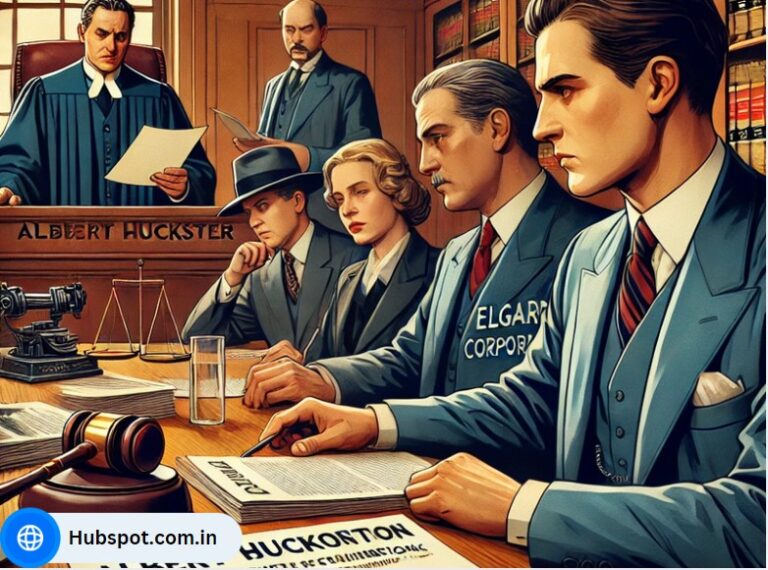In the landmark case of Albert Huckster v Elgard Case Brief, crucial legal principles were examined, particularly in the areas of contract law, fraudulent misrepresentation, and equitable remedies. This case has garnered attention for its implications in commercial law and contractual disputes. Here, we provide a comprehensive breakdown of the facts, legal issues, decisions, and the lasting impact of this important ruling.
Facts of the Case: An Overview
The Albert Huckster v Elgard Case Brief involves two primary parties: Albert Huckster, a business owner, and Elgard Corporation, a manufacturing company. The dispute arose when Huckster entered into a contract with Elgard for the supply of machinery meant to enhance production in his factory. Huckster claimed that Elgard had misrepresented the capabilities of the machinery, alleging that the machines delivered did not meet the agreed-upon specifications, resulting in significant financial losses for his business.
According to Huckster, Elgard’s sales team provided false assurances regarding the efficiency and performance of the machinery, leading him to sign a contract based on these alleged misrepresentations. Elgard, on the other hand, argued that Huckster had failed to fully understand the contract terms and had neglected to perform due diligence before making the purchase.
Key Legal Issues
This case presents several critical legal issues that are pivotal in understanding its significance:
- Fraudulent Misrepresentation: Did Elgard intentionally deceive Huckster with false statements about the machinery’s capabilities, and if so, what is the legal consequence of such a misrepresentation?
- Breach of Contract: Was the contract between Huckster and Elgard breached due to the alleged failure of the machines to perform as promised?
- Equitable Remedies: If Huckster successfully proved fraud or breach of contract, would he be entitled to rescission or other equitable remedies such as damages for the financial loss incurred?
These issues formed the foundation of the arguments presented by both parties during the litigation process.
Court’s Decision: A Detailed Breakdown
The court in Albert Huckster v Elgard Case Brief had to address complex factual and legal considerations. After a thorough examination of the evidence and testimonies, the court reached the following conclusions:
1. Fraudulent Misrepresentation
The court found that Elgard had indeed made several material misrepresentations regarding the machinery’s capabilities. These misstatements were not mere sales puffery but intentional falsehoods designed to induce Huckster into entering the contract. The court determined that Elgard’s sales team had acted with reckless disregard for the truth, meeting the legal threshold for fraudulent misrepresentation.
The court noted that under contract law, fraudulent misrepresentation occurs when one party knowingly makes a false statement with the intent to induce another party to enter into a contract. In this case, Elgard’s false claims about the machinery’s productivity gains and operational efficiency satisfied these criteria.
2. Breach of Contract
Alongside the issue of fraudulent misrepresentation, the court also considered whether the contract had been breached. The ruling highlighted that Elgard’s failure to deliver machinery that conformed to the specifications outlined in the contract constituted a clear breach of contract. The machinery, which was supposed to improve factory output, instead malfunctioned repeatedly, causing production delays and financial strain on Huckster’s business.
The court rejected Elgard’s argument that Huckster had misunderstood the contract terms. The judgment emphasized that Huckster had relied on Elgard’s assurances in good faith, and Elgard’s failure to provide the promised equipment was a breach of its contractual obligations.
3. Equitable Remedies
Given the findings of both fraudulent misrepresentation and breach of contract, the court ruled in favor of Huckster. The remedies granted included:
- Rescission of the contract: The court ordered the contract to be rescinded, effectively nullifying the agreement between Huckster and Elgard. This remedy allowed Huckster to be released from his contractual obligations.
- Compensatory damages: Huckster was awarded monetary damages to compensate for the financial losses incurred due to the faulty machinery and the disruption to his business operations.
Implications of the Case
The ruling in Albert Huckster v Elgard Case Brief has far-reaching implications, particularly in the field of commercial law and contract disputes. Here are some of the key takeaways from this case:
1. Strengthening Protections Against Fraudulent Misrepresentation
One of the most significant aspects of this case is its reinforcement of protections against fraudulent misrepresentation. The court’s decision underscores that businesses must provide truthful and accurate representations when entering into contractual agreements. Misleading or deceptive statements made with the intent to secure a contract can result in severe legal consequences, including the rescission of the contract and damages.
2. Importance of Due Diligence in Contractual Agreements
The Albert Huckster v Elgard Case Brief also serves as a reminder of the importance of due diligence in commercial transactions. Although Huckster prevailed in this case, it highlights the need for businesses to thoroughly verify the terms and conditions of a contract before finalizing any agreement. Had Huckster conducted a more thorough investigation into the machinery’s specifications, the dispute may have been avoided altogether.
3. Equitable Remedies and Fairness in Commercial Law
The court’s decision to grant rescission and compensatory damages reflects the principle that equitable remedies are designed to promote fairness in contractual relationships. When one party has been wronged through fraud or breach of contract, the legal system provides avenues for redress, ensuring that the injured party is made whole.
Conclusion: Lessons from Albert Huckster v Elgard Case Brief
The Albert Huckster v Elgard Case Brief is a landmark ruling that provides valuable insights into the legal principles of fraudulent misrepresentation, breach of contract, and equitable remedies. The court’s decision affirms that businesses have a legal duty to act honestly in their dealings and that victims of fraud or contractual breaches can seek redress through the courts.
This case highlights the importance of careful contract drafting, transparency in business negotiations, and the availability of legal remedies when agreements are breached. For businesses involved in contractual disputes, the case serves as a potent reminder of the legal consequences of fraud and breach of contract.




